The World Championship That Takes Place in a British Pub’s Parking Lot
The very English tradition of the British and World Marbles Championships.
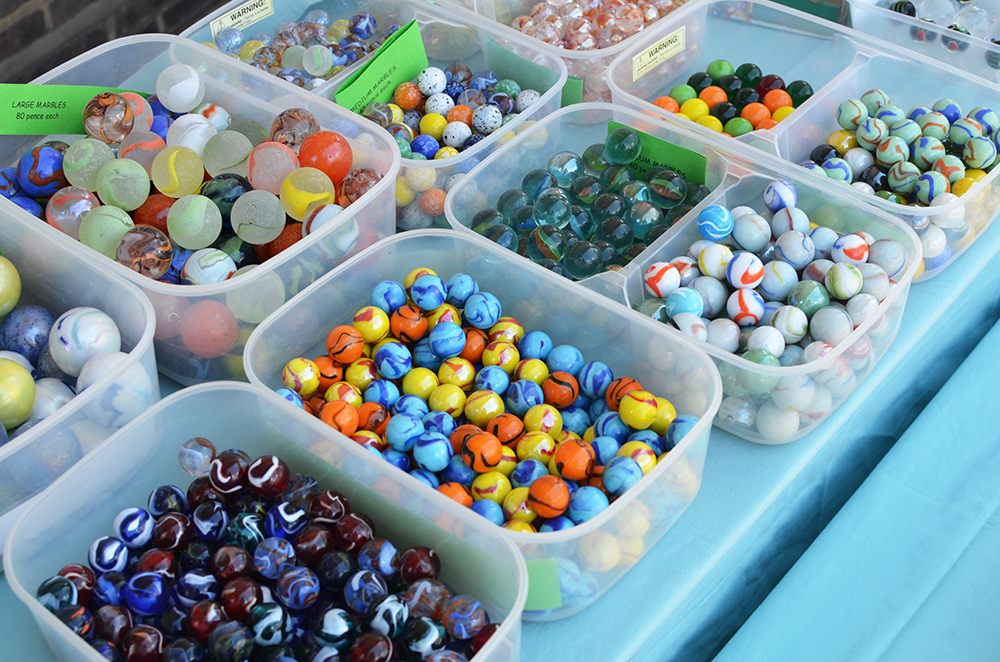
Marbles at the British and World Marbles Championships. (All photos; Linda Rodriguez)
In the parking lot of a pub near London, about 50 people are crowded around a kneeling figure. He’s a red-faced, middle-aged man wearing a Captain America T-shirt, a silver mask pushed up on his forehead, and a crumpled blue cape, crouched down on bent knee at the edge of a raised concrete circle, nearly two meters wide and covered in sand. While they watch, rapt, he knuckles down with his white “tolley” on his thumb, finds his shot, and flicks the marble on to the ring. It sails past the cluster of red target marbles and does nothing helpful whatsoever.
He laughs and the crowd hoots with disappointment or joy— “Oooh, bad luck!”, “Waa-hey!”. A small boy in a Minions mask and a yellow cape is dispatched to retrieve the tolley, the traditional name for the shooting marble, before it goes too far, the next player gets into position and pretty much everyone watching picks up their pint.
This is the British and World Marbles Championship.
Marbles have been around for about as long as recorded memory. They were found in the tomb of an Egyptian child, buried at Nagada around 4000 BCE; at the Minoan site of Petsofa in Crete, dating back to 2000 to 1700 BCE; allegedly in the volcanic ash of Pompeii, 79 AD; and in Cherokee tradition from 800 AD. Bruegel the Elder’s frankly terrifying 1560 painting Children’s Games shows two groups of children engaged in marbles; Shakespeare name-checked a marbles game, Cherry Pit, in Twelfth Night; 17th and 18th century Dutch wall tiles depicted children playing with marbles. Marbles come in glass, stone, clay, and the ways to play with them are endless. Though they’ve never really gone away, marbles haven’t been hugely popular since the 1970s, and now, kids are more likely to head to the App Store than the toy store for recess games (at least, those with access to a smartphone).
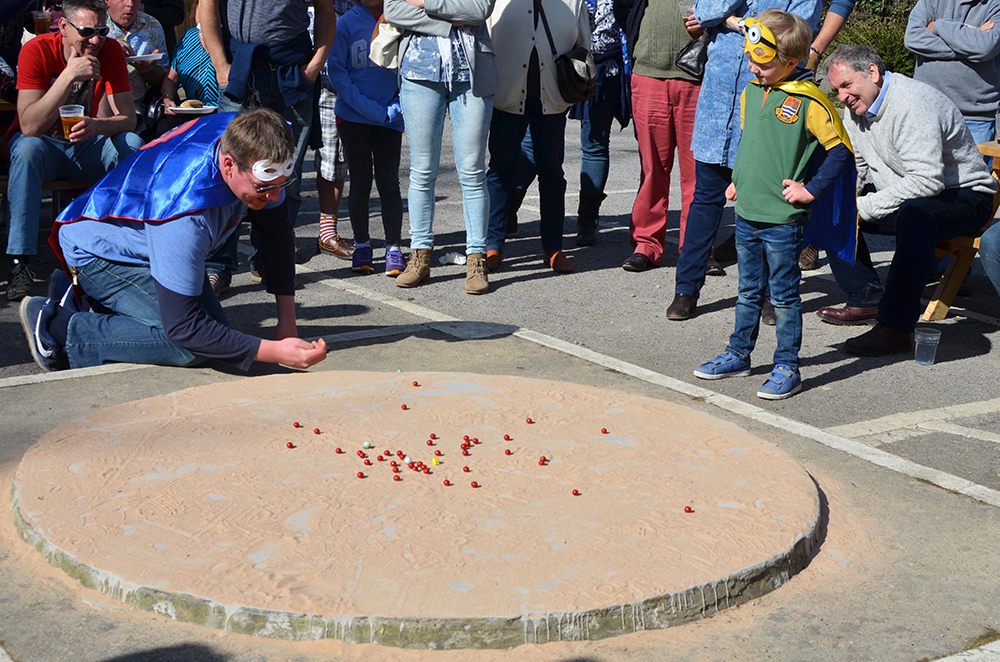
The contestants battle it out.
But here at the Greyhound Pub in Tinsley Green, West Sussex, marbles remains what it’s always been: A pub game, best accompanied by a pint of real ale and some sunshine. And while it’s not exactly nestled in picturesque, olde wolde English countryside—planes to and from nearby Gatwick Airport regularly buzz overhead, and it’s just around the corner from a bland office park—the Greyhound is the spiritual home of traditional British marbles.
The official history of the British and World Marbles Championships places its start as Good Friday 1932; the tournament has been played at the Greyhound continuously ever since. But even in the 1930s, ancient, bearded mibsters (marbles lingo for a player) claimed to have been competing in the tournament 50 years before. In fact, the tournament reputedly dates back to Elizabethan times, and although that may be a bit of local legend, it comes with a great story: In 1588, a young man of nearby Surrey and young man of West Sussex were both vying for the hand of a Tinsley Green maiden. She set them to a series of competitions and tasks, but they consistently tied. Finally, she told them to play marbles; with 49 marbles in the ring, then made out of clay or stone, there had to be a clear winner.
Who actually won is unknown, though. The big blue plaque on the side of the pub relating the story didn’t have an answer, and neither did Sam McCarthy Fox, organizer of the tournament and secretary of the British Marbles Board of Control.
Hundreds of spectators in 1938, although the crowds thinned out considerably from 12 to 2 p.m., when everyone would rush inside to grab a pint during the hours that the pub’s bar could be legally open on a bank holiday.
This is McCarthy Fox’s 40th year organizing the championship, but he’s been playing in it since he moved from London to nearby Crawley as young lad in 1956; he’s never left the area and he’s never left the game, either. “You never stop playing with marbles, once you’ve got it in your blood,” he said.
The game remains the same as it was McCarthy Fox first started playing, probably the same as it was for the Surrey and West Sussex lads: 49 red glass target marbles are placed in the center of a ring covered in sand, 1.8 meters in diameter. Two teams of six players each alternate turns, shooting the target marbles with their tolleys; the name for the shooting position is “knuckling down”, because the players make a fist, knuckles pointed down, with the tolley resting on their thumbnail. The goal is to knock out as many of the 49 target marbles in the center of the ring as possible; the first team to knock out 25 marbles wins the match. The traditional local marbles season is Ash Wednesday to Good Friday—Lent. “Lent is a time where you have to give things up and football and all the other sort of games were deemed to be too boisterous. But marbles was a nice little game that you could play during Lent,” McCarthy Fox explained. When did that start? “It’s like all these things, in the mists of time sort thing—you don’t really know, do you?”
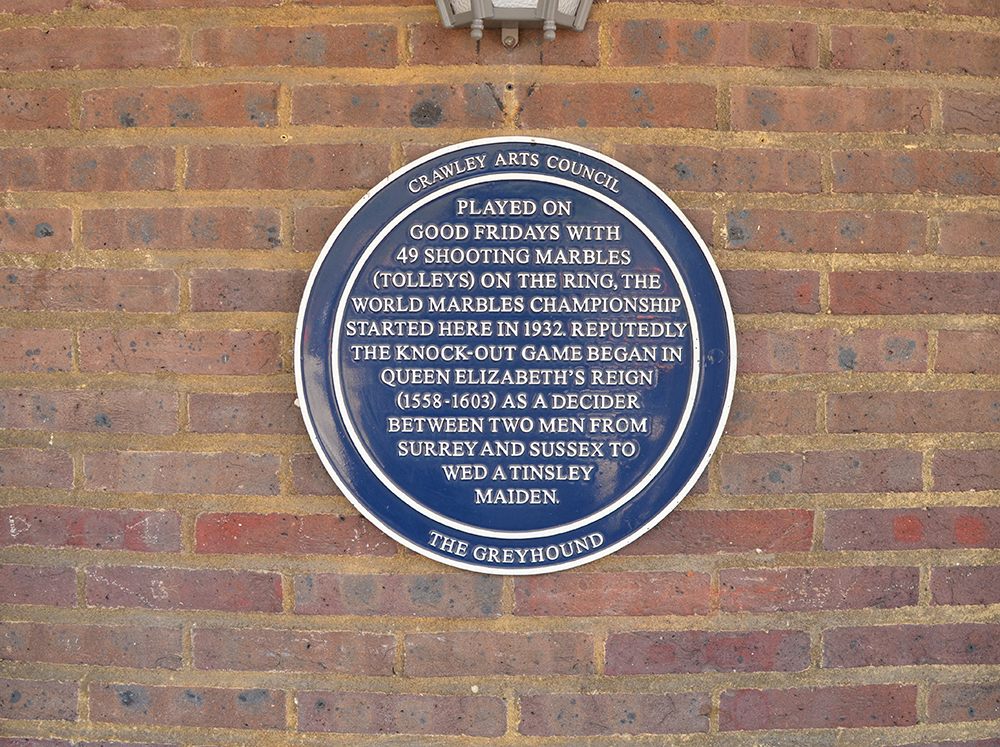
The British and World Marbles Championships has been played at the Greyhound continuously since Good Friday, 1932.
In 1976, McCarthy Fox says, the decision was made to move the tournament from the Greyhound Pub to a big sports center in Crawley. To play on Astroturf. That didn’t sit well with him or with a number of regular players.
“It’s just not the place,” he said of the attempted move, concluding resolutely, “A village inn is the place for village sports.” So while the “official” tournament moved to the sports centre, McCarthy Fox “let it be known” that he’d keep playing at the Greyhound. He was joined by six teams. The tournament at the sports center didn’t survive past the first year; the tournament at the Greyhound thrived. Now, every year, driving rain, sleet or snow, the British and World Marbles Championship goes ahead. (This Good Friday, no one needed that kind of fortitude—it was sunny all day, a source of perpetual surprise and joy to everyone.)
Not too long after Sam McCarthy Fox took over running the event, he was joined by his wife, Julia (she “married into marbles”, she says, and their 19-year-old son, Zachary, was certainly born into them). On the day of the 2016 tournament, he is wearing a purple t-shirt that reads, “Keep Calm and Let Julia Sort It All Out.” “Would you argue with her?” he asked in a low voice, smiling. “I wouldn’t.” Julia is indeed a force. Even though she does not play – “I cannot fathom how anyone can make a marble go where you want it to, let alone knock out four others at the same time and stay where they want it to!” she says – she is the one who sets up the play brackets, takes the pictures, does the Facebook page, makes sure the pub is opened on time, and deals with the Mayor’s office when the Mayor of Crawley wants to play (she’s playing this year, wearing her big Chain of Office). She buys the prizes (boxes of craft beer for the runners up; the old joke is that the most skilled team actually comes in second), gets the medals, and makes sure the previous year’s winner returns the silver Meux cup trophy, which has been in use since the 1930s.
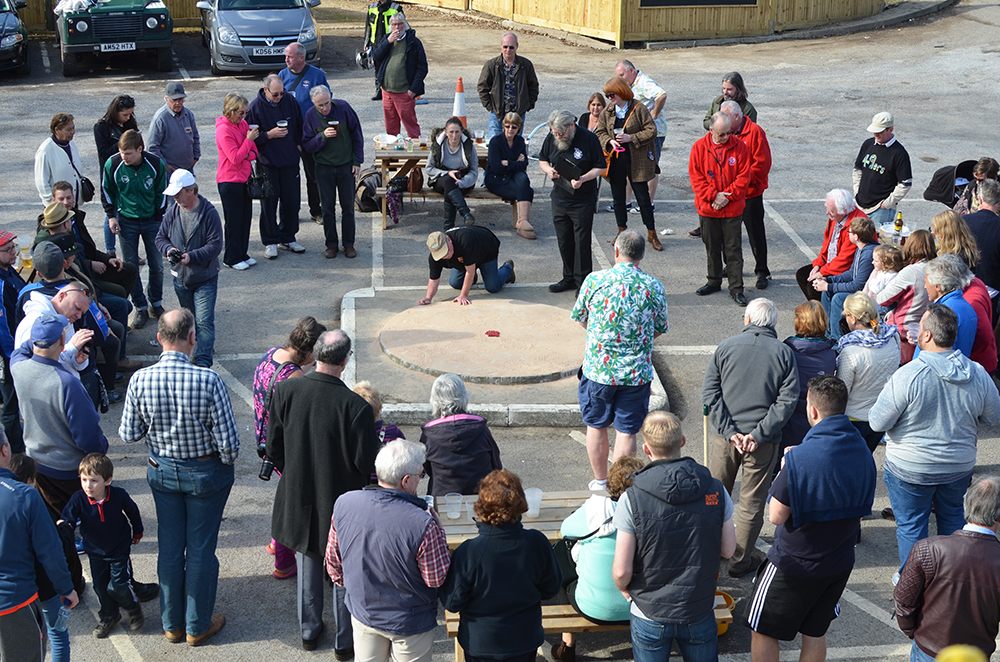
Forty-nine red glass target marbles are used in a game.
She used to send out press releases, too, she says, but she stopped when she realised that they didn’t need any more publicity—the event is a favorite of British media; Sam even earned his Blue Peter badge after going on the popular UK children’s show and teaching the presenters how to play marbles. The number of teams and spectators has plateaued over the last few years, she says, up from the initial six teams that Sam started with in the 1970s to around 20 to 25 teams. This year, there were 19 teams, overwhelmingly middle-aged men, plus assorted supporters—“wives and girlfriends, sometimes both,” Sam McCarthy Fox jokes—so upwards of 150 people were milling around the pub’s grounds (planned engineering works putting a major train line out of commission probably explained the slightly lower numbers). In addition to the ring at the front of the pub in the parking lot, there are several more rising out of the grass and mud in the beer garden at the side of the pub, so matches early in the day take place concurrently; once a ring is no longer needed for the tournament, people from different teams and spectators played ad hoc matches. There are no entry requirements, Julia McCarthy Fox says: They’ll let anyone play, as long as they can pay the £30-per-team entry fee and make it to the match on time.
So how is this competition, held annually in a pub parking lot, global? Throughout the tournament’s history, a few teams have come from around the world: Canadian soldiers stationed in the area played during World War II; in the 1950s and ‘60s, it was American airmen. A player from the small but vibrant Japanese marbles circuit played in the 1970s; the French sent teams in the 1990s, as did the Americans again. Now, it’s the German teams, always at least one since the mid-1990s, whose annual presence currently occasions the “World” in the championship title. This year, about half the teams were from the local area, the rest from Yorkshire, Swansea, and Germany, easy to spot in their bespoke team jackets.
“People like the idea of being part of keeping traditions alive. I think that’s it as much as anything, and they like something that is a bit competitive,” explained Julia McCarthy Fox, sitting in the “office”—the upstairs function room of the pub—and tallying up the scores at the halfway through the tournament.
“And it’s at a pub,” chimed in son Zachary McCarthy-Fox, 19, between mouthfuls of burger.
“And it’s at a pub,” she agreed.
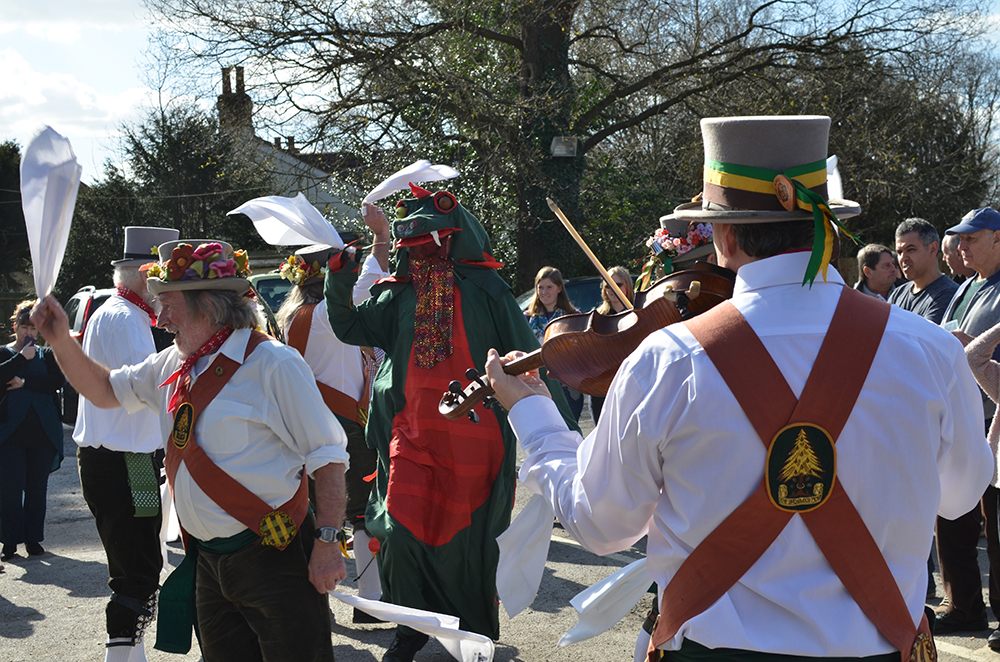
The Broadwood Bombers, a group of Morris dancers, perform along with a man dressed as a dragon.
That is a significant difference to how marbles is played everywhere else. Marbles, in much of the world, is a schoolyard game; in the U.S., for example, the National Marbles Championships, held annually in New Jersey since 1922, are only open to children 14 and under. (The U.S. game is also different, played by individuals, not teams, on a larger ring and with fewer marbles.) Marbles here, in this corner of West Sussex, is a pub game and the pub in English culture, however endangered it may be, remains one of its most important community centers, inspiring deep loyalty.
Neil White is a local lad who married an American woman and has lived in Colorado for the last 10 years (he’s wearing a bright orange Denver Broncos t-shirt and his wife is in a Denver Broncos sweatshirt). But he comes back every Good Friday to play with his team, the Black Dog Boozers, so named for their pub. This year, he spent nine hours stuck in his car in a snowstorm just trying to get to the airport, landing in London with just enough time to get to the championships and enter the Golden Oldies over-50 competition (the number of players in this category, Julia says, is increasing every year). He began playing marbles in the same way that some of the other players did: “There was a concrete ring in the beer garden at the Black Dog,” he explained, adding that the pub was across the street from his former home in nearby Crawley. “I started drinking with these guys and then started playing marbles with these guys, and we had our own team. … It’s fun.”
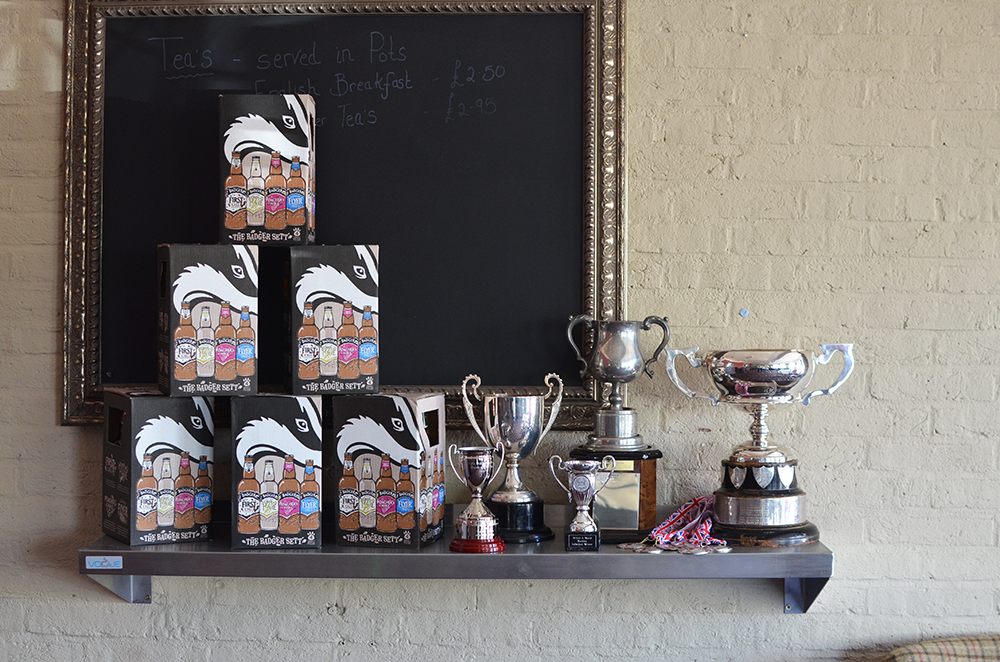
Trophies on display Greyhound Pub.
It is fun (although a bit like darts or any other pub game, marbles is the most fun when you or someone you know is playing). Good fun— in the grand British tradition, several teams were in scrappy fancy dress: The Super Marble Heroes, whose capes, clearly meant for children, still had creases from being only lately released from their packaging, were a motley crew that included Captain America, Batman, the Flash, and a bee in a blue cape and yellow wellies. The 49ers, most in plaid flat caps, had their team name appliquéd to their T-shirts in plaid fabric, and one of their number paired his T-shirt with tights in a colorful marbles print; when a small boy later took off his shirt, someone wrote “49ers” on his belly in black marker. The Broadwood Bombers, a team of Morrismen in full Morris dancing regalia who performed a kind of halftime show in the afternoon, also included a man dressed as a giant green dragon. His homemade costume exhaled smoke from its nostrils and had motorized ping-pong ball eyes that he could make point in different directions; he was armed with his “Hornmonica” (patent pending), a combination horn and harmonica that he carried over his hand and use to make rude sounds. He also explained that his “marbles name” is Big Balls Ellison the III, “because my father and my grandfather before him were the second and the third, of course,” he said, adding that he came from a “long line, long line of marble players”. (Given the crowd and the venue, it’s an opportunity for a lot of ball-related puns, not all them family friendly. “We do have a rule that anything that anyone is called has to be suitable to read over the PA or they’re not allowed it,” Julia said with a laugh.)
The draw of the British and World Marbles Champion is the friendly competition, the pints, the hope of sunny weather—but most especially, the tradition. “People in England are bit weird,” explained Zachary McCarthy Fox, who has played marbles virtually his entire life and still enjoys it. And this whole tradition, he says, is a bit weird and very English. “It’s sort of the pinnacle of an English weekend, isn’t it, really? In the pub, in the sun, bit of Morris dancing, and old tradition. Because that’s sort of strongly associated with England, isn’t it? Traditions.”
As the crowd thinned, the remaining teams played until after that warming sun everyone was talking about went down; in the dark, car headlights illuminated the ring. The finals came down to last year’s winners, the 1st MC Erzgbirge of Germany, facing off against the Yorkshire Meds. And in perhaps the most magically nostalgic moment of the whole traditional day, the Meds won.



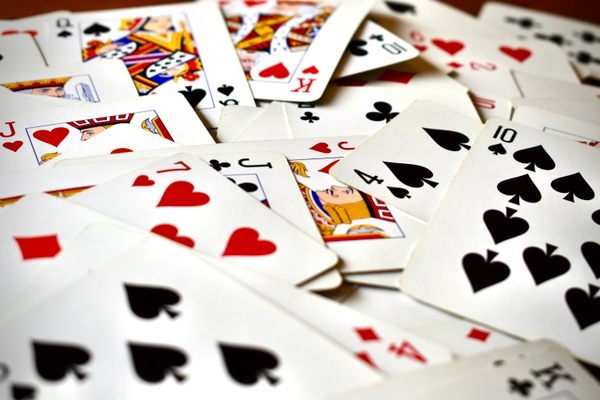
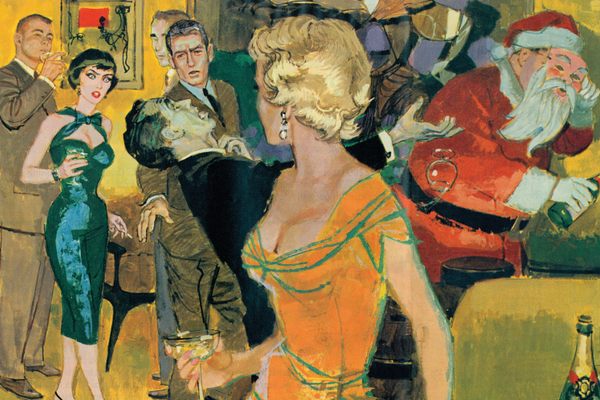

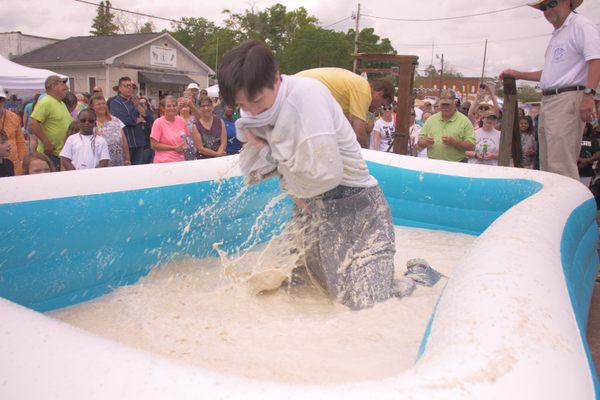


Follow us on Twitter to get the latest on the world's hidden wonders.
Like us on Facebook to get the latest on the world's hidden wonders.
Follow us on Twitter Like us on Facebook